This document discusses static type checking in compilers. It begins by describing the structure of a compiler and how static checking fits in. It then contrasts static and dynamic checking. The rest of the document discusses various aspects of static type checking like type rules, type systems, and implementing static checking using syntax-directed definitions in Yacc. It provides examples of basic type checking for expressions and statements in a simple language. It also discusses type expressions, conversions, and functions.
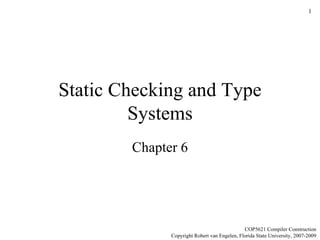
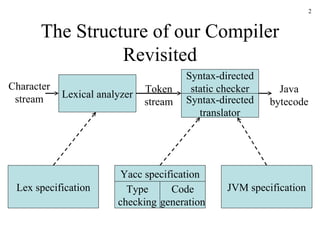
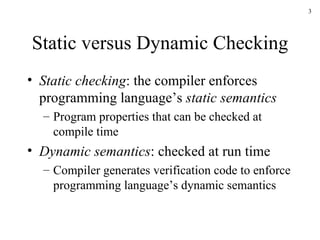
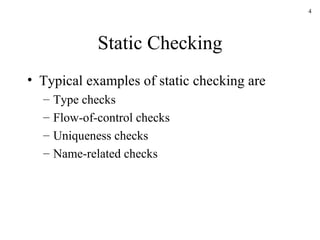
![Type Checks, Overloading, Coercion, and Polymorphism int op(int), op(float); int f(float); int a, c[10], d; d = c+d; // FAIL *d = a; // FAIL a = op(d); // OK: overloading (C++) a = f(d); // OK: coersion of d to float vector<int> v; // OK: template instantiation](https://image.slidesharecdn.com/ch6-091220235730-phpapp02/85/Ch6-5-320.jpg)
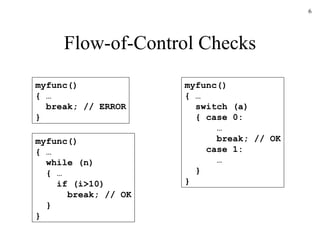
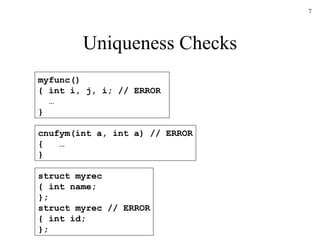
![Name-Related Checks LoopA: for (int I = 0; I < n; I++) { … if (a[I] == 0) break LoopB; // Java labeled loop … }](https://image.slidesharecdn.com/ch6-091220235730-phpapp02/85/Ch6-8-320.jpg)
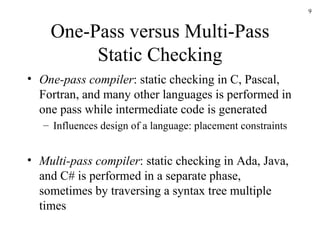
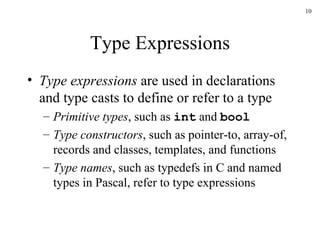
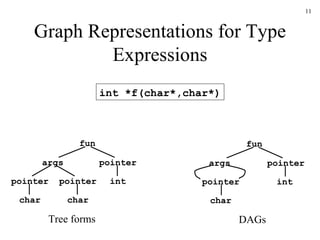
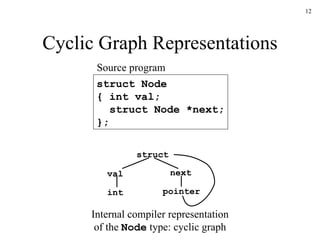
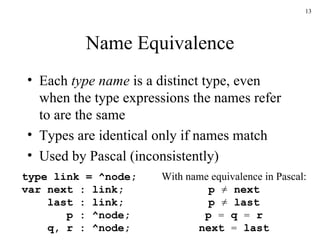
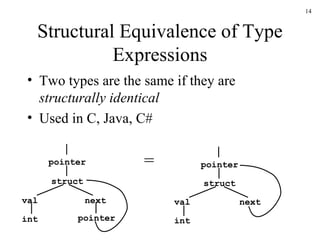
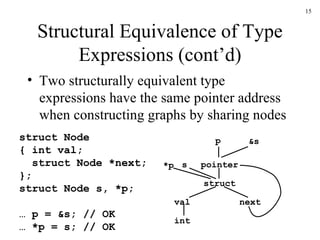
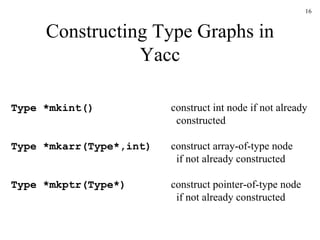
![Syntax-Directed Definitions for Constructing Type Graphs in Yacc %union { Symbol *sym; int num; Type *typ; } %token INT %token <sym> ID %token <int> NUM %type <typ> type %% decl : type ID { addtype($2, $1); } | type ID ‘[’ NUM ‘]’ { addtype($2, mkarr($1, $4)); } ; type : INT { $$ = mkint(); } | type ‘*’ { $$ = mkptr($1); } | /* empty */ { $$ = mkint(); } ;](https://image.slidesharecdn.com/ch6-091220235730-phpapp02/85/Ch6-17-320.jpg)
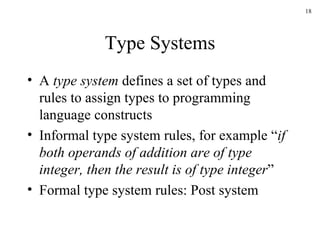
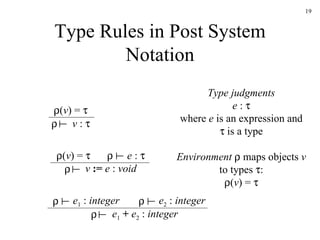
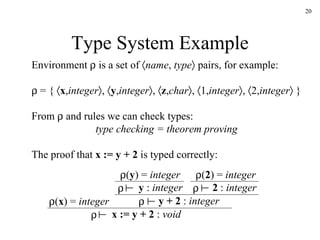
![A Simple Language Example P D ; S D D ; D id : T T boolean char integer array [ num ] of T ^ T S id := E if E then S while E do S S ; S E true false literal num id E and E E + E E [ E ] E ^ Pascal-like pointer dereference operator Pointer to T](https://image.slidesharecdn.com/ch6-091220235730-phpapp02/85/Ch6-21-320.jpg)
![Simple Language Example: Declarations D id : T { addtype ( id .entry, T .type) } T boolean { T .type := boolean } T char { T .type := char } T integer { T .type := integer } T array [ num ] of T 1 { T .type := array (1.. num .val, T 1 .type) } T ^ T 1 { T .type := pointer ( T 1 ) Parametric types: type constructor](https://image.slidesharecdn.com/ch6-091220235730-phpapp02/85/Ch6-22-320.jpg)
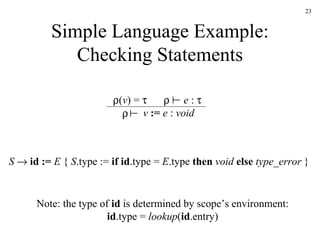
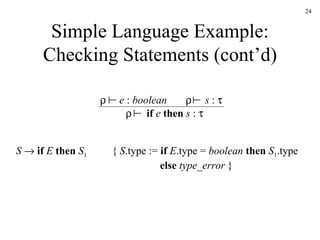
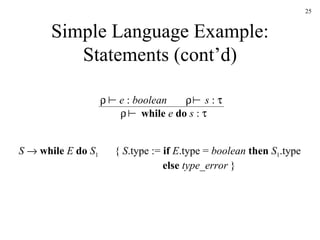
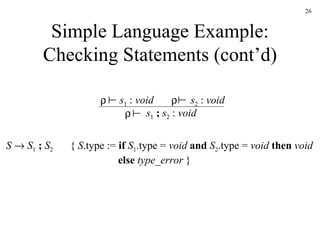
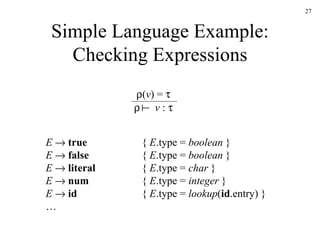
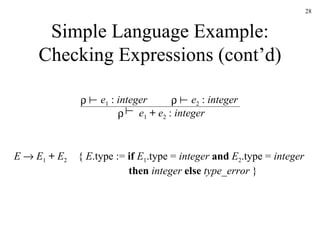
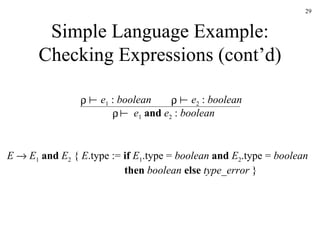
![Simple Language Example: Checking Expressions (cont’d) E E 1 [ E 2 ] { E .type := if E 1 .type = array ( s , t ) and E 2 .type = integer then t else type_error } e 1 : array ( s , ) e 2 : integer e 1 [ e 2 ] : ](https://image.slidesharecdn.com/ch6-091220235730-phpapp02/85/Ch6-30-320.jpg)
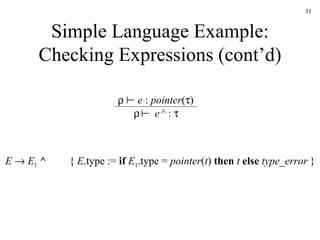
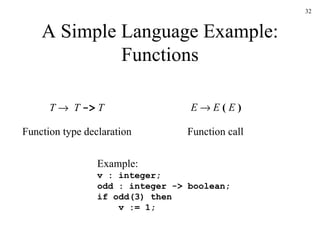
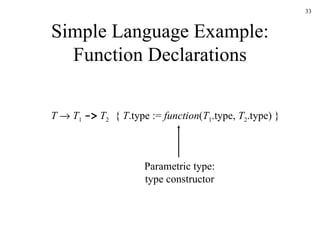
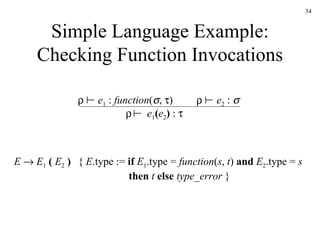
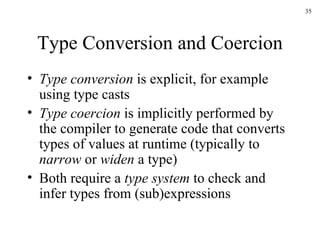
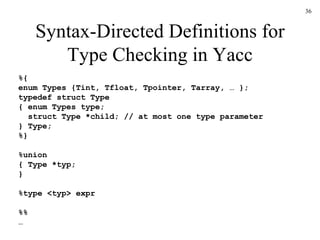
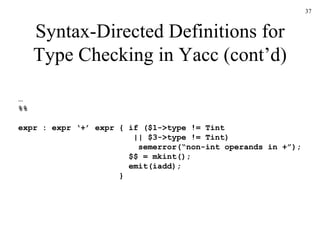
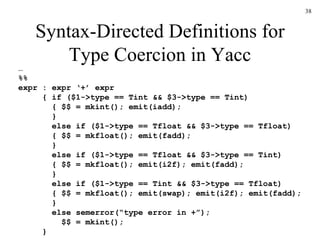
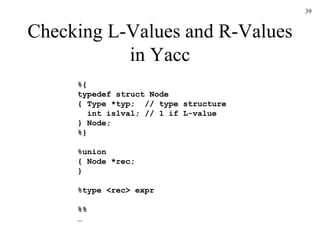
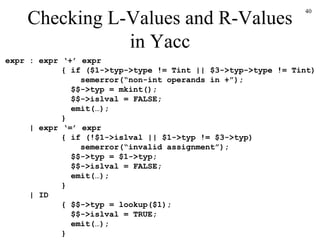
![Type Inference and Polymorphic Functions Many functional languages support polymorphic type systems For example, the list length function in ML: fun length ( x ) = if null ( x ) then 0 else length ( tl ( x )) + 1 length ([“sun”, “mon”, “tue”]) + length ([10,9,8,7]) returns 7](https://image.slidesharecdn.com/ch6-091220235730-phpapp02/85/Ch6-41-320.jpg)
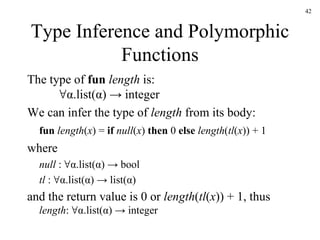
![Type Inference and Polymorphic Functions Types of functions f are denoted by α->β and the post-system rule to infer the type of f ( x ) is: The type of length ([“a”, “b”]) is inferred by e 1 : α -> β e 2 : α e 1 ( e 2 ) : β length : ∀α.list(α) -> integer [“a”, “b”] : list(string) length ( [“a”, “b”] ) : integer …](https://image.slidesharecdn.com/ch6-091220235730-phpapp02/85/Ch6-43-320.jpg)
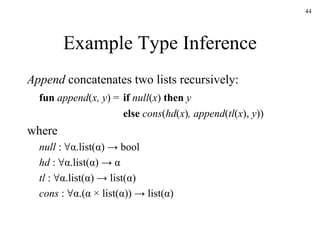
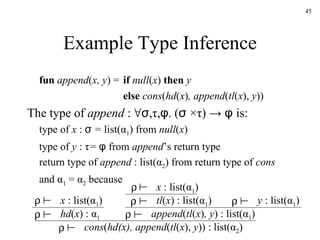
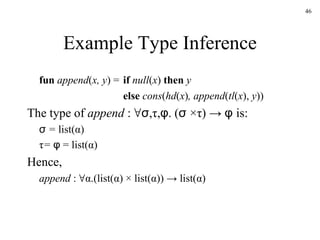
![Example Type Inference append ([1, 2], [3]) : τ append ([1, 2], [3]) : list( α ) ([1, 2],[3]) : list( α ) × list( α ) τ = list( α ) α = integer append ([1], [“a”]) : τ append ([1], [“a”]) : list( α ) ([1],[“a”]) : list( α ) × list( α ) Type error](https://image.slidesharecdn.com/ch6-091220235730-phpapp02/85/Ch6-47-320.jpg)
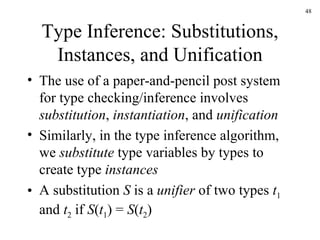
![Unification An AST representation of append ([], [1, 2]) apply append : ∀α.(list(α) × list(α)) -> list(α) [] : list( φ ) 1 : integer ( × ) : ( σ , τ ) [ , ] : list( ψ ) 2 : integer](https://image.slidesharecdn.com/ch6-091220235730-phpapp02/85/Ch6-49-320.jpg)
![Unification An AST representation of append ([], [1, 2]) apply append : ∀α.(list(α) × list(α)) -> list(α) ( × ) : ( σ , τ ) [] : list( φ ) [ , ] : list( ψ ) 1 : integer 2 : integer τ = list( ψ ) = list(integer) ⇒ φ = ψ = integer σ = list( φ ) = list( ψ ) ⇒ φ = ψ Unify by the following substitutions: σ = τ = list( α ) ⇒ α = integer](https://image.slidesharecdn.com/ch6-091220235730-phpapp02/85/Ch6-50-320.jpg)